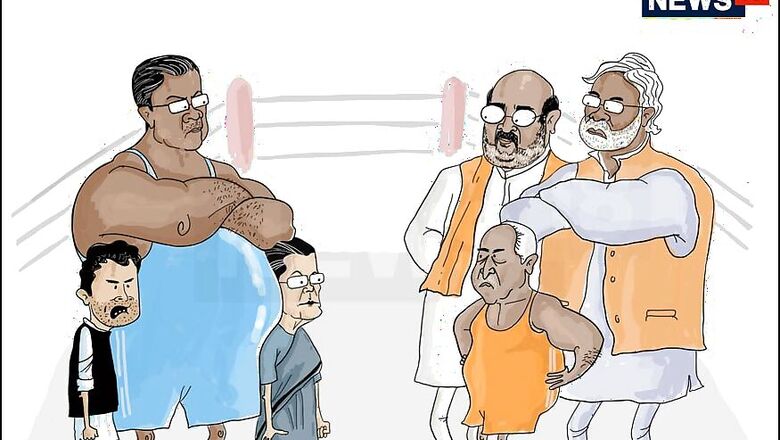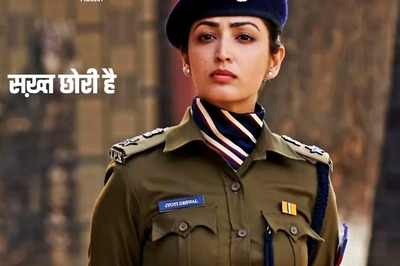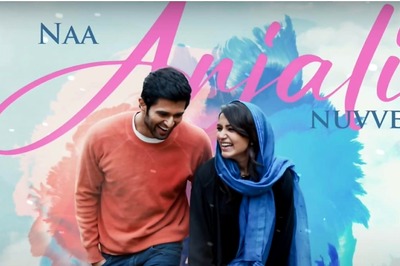
views
Bengaluru: With the campaign for Karnataka Assembly elections now over, the poll pundits are now shifting the focus from macro to micro issues.
Even though all three major players – ruling Congress, main opposition BJP and the third player JDS - claim that they will form the government on their own, some of their own leaders and the political analysts are furiously debating several post-poll scenarios.
In a highly caste-ridden state like Karnataka, all election debates finally lead to caste analysis slicing them into small pieces. The Chief Minister Siddaramaiah-led ruling Congress is confident of retaining the government and has been throwing all kinds of theories at the media to back its claims.
The BJP is also ready with its own data and hopeful of a win.
The JDS, trying hard to create a badly hung Assembly, claiming that it will come to power is making its own calculations.
But most agree that there can be only four post-poll scenarios.
Scenario One
The Congress wins again. If the Congress has to win again, it must get at least 40% of the total votes and push the BJP below 35% and JDS below 20%. Many political observers feel that if there is a big upper caste mobilisation against the Siddaramaiah government, he will have to make his core vote bank AHINDA (Minorities, Backward Classes and Dalits) rally behind him in large numbers.
According to “leaked” caste census, upper castes have about 35% population and the AHINDA, including STs, has 60% population. But it may not make the job easier for the Congress because this combination has too many sub-castes and sects. The OBCs or Other Backward Classes alone have 99 castes. Siddaramaiah’s caste Kurubas constitute 7% of the total population and about 30% of the OBC population. Even among the OBCs there is a caste hierarchy and some castes are considered lower and some are considered upper. If there is an upper caste backlash, the Muslims, Christians, Dalits, Kurubas and STs stand behind the Congress, the “hand” can easily ride to power. The Muslims are about 16%, Christians 2-3%, Kurubas 7%, Dalits 19.5% and STs 5% are a formidable combination.
The same combination of the Congress led by Devaraja Urs had put an end to upper caste Lingayat and Vokkaliga hegemony in Karnataka politics in the early 1970s. In the last 20 years the same combination has got disintegrated and has not actually voted as a block to any single political party. Siddaramaiah dismisses all these theories as an academic exercise and claims that all castes and religions vote for the Congress and he won’t believe in these things.
“All castes and religions have rich and poor. All have their own ideologies. It would be unfair to say one particular caste votes for a particular party. The Congress is for all. We have done a lot for AHINDA. I am proud to say that I am with AHINDA. But at the same time, I am not against other castes, mainly upper castes. Our government schemes have benefited all including the Brahmins, Lingayats and Vokkaligas. I am sure all of them will back us”, the Chief Minister said.
The political analysts believe that if 2/3 of AHINDA voters back Congress, a small portion of the upper caste vote is good enough for the Congress to sail through.
Scenario Two
The BJP wrests power. The BJP’s core vote bank is Lingayats, who constitute about 14% of the state’s population. Some Lingayat organisations claim that they are over 17%. The separate religion fight and Congress’ full backing to that demand have complicated the matters this time. The Congress argues that many Lingayats no longer view BJP as their party and they may vote for the Congress in this election. But the BJP is confident of getting Majority Lingayat votes this time too. If it manages to split OBCs and Dalit votes plus STs, with the strong backing of Lingayats and other smaller upper castes the BJP can romp home. It is a fact that the BJP has been getting the support of several OBC and Dalit sub-castes for the past 15 years and the Congress no longer has a monopoly over it. A major breach in its Lingayat fortress and a moderate OBC, Dalits and ST backing can deny the BJP power this time. Otherwise, the BJP can put up a good fight and it can even win the state for the second time.
Scenario Three
The JDS surge creates a badly fractured Assembly. For that, the JDS needs its core vote bank Vokkaligas plus others. According to “leaked” caste census, Vokkaligas are just 11% of the total population in Karnataka. However Vokkaligas claim that they are 15-16%. Massive mobilisation of the Vokkaligas behind the JDS can get them a good number of seats, but to cross the 40 seats Gowda’s party needs the backing of non-Gowda castes and minority votes. In 2004, the JDS won 58 seats creating a badly hung Assembly with the support of OBCs, Dalits and Muslims. And Siddaramaiah was with them then. The splitting of OBCs, Dalits and Minorities votes among the Congress, BJP and JDS can throw up a badly hung Assembly. The former Prime Minister HD Deve Gowda is hoping for that to remain relevant in the state and at the Centre.
Scenario Four
Congress or BJP will cross 100 or go above 90 seats and the runner up will be close behind with JDS a distant third. It can happen only if the upper castes, OBCs and Dalits more or less equally divide their votes between Congress and BJP. And the JDS fails to get non-Vokkaliga votes in a big number. In that case the JDS will be vulnerable and may even face a split.
One thing is certain that political pundits and the political leaders alike will continue to debate these scenarios till the counting day and they do post-mortem based on the same caste combinations after that.




















Comments
0 comment